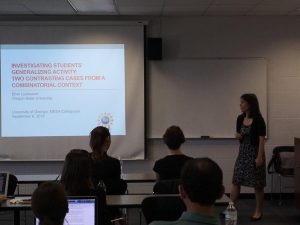Come support our colloquium event!
November 5th, 2018
3:30 pm colloquium (4:30 pm Q&A)
Aderhold room G5 (224 for Q&A)
“Taking Learning Trajectories to Scale in a Digital Learning System for Middle School Math”
This talk reports on the design and implementation of Math-Mapper6-8, a digital learning system hosting a learning map organized around nine big ideas, learning clusters and constructs. Underlying each construct is a learning trajectory (LT) and its associated CCSS-M standards. It is accompanied by a diagnostic assessment system for use within classroom instruction showing progress along the LTs. The talk will focus on applying the validation framework to ratio reasoning and process of continuous validation, stressing the critical role of the interdisciplinary collaboration between learning scientists and psychometricians.

